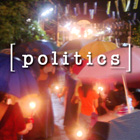
|
'PERMANENT CEASEFIRE' DECLARED BY ETA BEGINS TODAY
EU FOREIGN MINISTERS WELCOME "END OF THE LAST TERRORIST GROUP IN EUROPE" 24 March 2006 Spain's 4-decade long conflict with terrorist group ETA, fighting for separation of the Basque country from Spain, today appears at an end. Two days ago, the organization surprised many by declaring a "permanent ceasefire", without receiving any guarantees about its goals or about the future of its membership. The socialist government of José Luis Rodríguez Zapatero had taken the position that peace talks would be necessary to create a comprehensive end to the violence, but in keeping with long-standing Spanish government policy, had decided it would not open negotiations on any level unless ETA laid down its weapons comprehensively and permanently. During the last year, raids along the French border and in Spain had captured many, if not most of the top figures in the separatist militia, along with a large cache of weapons and explosives. Former leaders long in prison had issued open letters to current ETA members saying that the campaign of violence had outlived its usefulness and peaceful political means should be used to pursue the group's aims. As anecdotal reports in print and on television emerge from the Basque country (Euskadi to the locals), there seems to be cautious optimism, with some saying the ceasefire declaration was the most joyous occasion of their lives. Members of the political opposition have expressed open hostility and skepticism, however, saying that the group must cease to exist entirely, its members turn themselves in to authorities, all weapons be handed over and destroyed, and all involved face potential prosecution. A spokesperson for the PSC (ruling socialist party's Catalán franchise) has said that attempts by the "extreme right" to link ETA's radicalism and the constitutional Catalán campaign to reform the regional Estatut are "miserable" and "shameless". (The opposition PP contains political elements linked to Spain's radical conservative movement, including some who were part of the fascist government of Francisco Franco and others who voted against the nation's democratic constitution in 1979.) The Catalán Estatut was approved by the Consitutional Commission of Spain's national Congress on Tuesday, and some have observed that it may have been a sign of hope for Basque aspirations of greater autonomy. Leader of the "Catalanist" Convergéncia party (CiU), Artur Mas has said he believes it would have been "more difficult" to achieve peace in Euskadi without the successful, constitutional process to grant more autonomy to Catalunya. In fact, the truce was likely spurred along by support by all of Spain's parliamentary parties except the PP (which has declared at its recent convention a strategy of opposing all policies of Zapatero, regardless of content, as "the only means of coming back into power") for the government's policy of negotiations only after a comprehensive truce. El País has reported it discovered evidence that the King of Spain, don Juan Carlos I, personally phoned opposition PP leader, Mariano Rajoy, after he suggested his party would not support the government's peace efforts. Rajoy denies such a call took place, but the newspaper insists it has proof the call took place, and that the King asked Rajoy to work in the nation's interest and not reject an historic opportunity for peace. ETA has declared ceasefires before, but always placing conditions and using terms like "total" or "indefinite". This is the first time the group has described its promise of peace as "permanent". And, while many observers express hope, it does seem there is a "wait and see" attitude among politicians and members of the public, who wait now to see if a new peace process can bear fruit. [s]
|
||||||
|
|||||||

